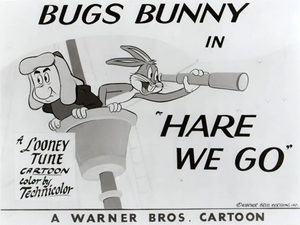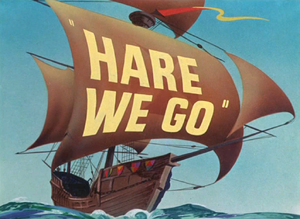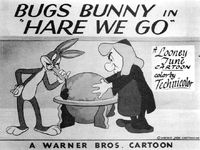Hare We Go
From Looney Tunes Wiki
Jump to navigationJump to search
| Hare We Go | |
|---|---|
 Lobby card. | |
| Production company | Warner Bros. Cartoons |
| Distributor | Warner Bros. Pictures The Vitaphone Corporation |
| Release date | January 6, 1951 |
| Starring | Mel Blanc Grace Lenard |
| Producer(s) | Edward Selzer |
| Music composition | Carl Stalling |
| Story | Warren Foster |
| Animation | Phil DeLara Charles McKimson John Carey Rod Scribner J.C. Melendez |
| Director(s) | Robert McKimson |
| Series navigation | |
| ← Previous | Next → |
| Title card | |

| |
Hare We Go is the three hundred and thirty-sixth Merrie Melodies theatrical short. It was distributed by Warner Bros. Pictures and The Vitaphone Corporation on January 6, 1951. It was written by Warren Foster, produced by Edward Selzer and directed by Robert McKimson.
In 1492, Columbus sailed the ocean blue and brings Bugs along as a mascot, to prove to Queen Isabella of Castile that the world is round. But his crew believe that Bugs is jinxed with bad luck.
Detailed summary
Memorable quotes
Bugs: No use changin' da history books for lil' ol' me. Eee-hee-hee-hee-hee-hee...
Characters
In order of appearance: | ||||||||||
| ||||||||||
Locations
Objects
- Globe
- Baseball
- Columbus' diary
- Banjo
Vehicles
- Columbus' ships
Production

Development
Filming
Music
The music was composed by Carl Stalling.
The song "Christopher Columbus" was used in this cartoon.
Release
Dates are in order of release:
- United States: January 6, 1951 in theaters
Behind the scenes
- The title is a pun on the phrase "Here we go!"
- The working title was "Lucky Rabbit's Feat."
- Columbus' portrayal in the short is a caricature of Fredric March's portrayal in the 1949 feature film of the same name.
- This cartoon, alongside Rabbit Every Monday and The Fair Haired Hare, are the only cartoons from 1951 to not get a Blue Ribbon reissue. They incidentally all feature Bugs Bunny as the star.
Errors
- Despite being played as a comedy, the short contains a few historical inaccuracies:
- Columbus' journey and eventual landing of the Americas in the short was to prove that the earth was round. In reality, it was to find a new sea route to India, China, Japan and the Spice Islands, to profit on rich cargoes of silks and spices. Upon his attempted arrival, he assumed that the Americas was East Asia.
- Additionally, the spherical earth theory was already established as physical fact by the 5th century BC, when it was spread by Greek philosophers such as Aristotle, and eventually adopted by the Old World during Late Antiquity and the Middle Ages.
- While Columbus claims to have discovered the Americas in the short, he did not do so in reality, but was the first European to have explore the area since the Norse Vikings' colonization of Greenland and Newfoundland in the 10th century. However, he was the first European to land on the Bahamas archipelago in an island later known as Hispaniola, now split into Haiti and the Dominican Republic; Columbus' subsequent travels would go further to Central and South America following his expedition in 1492.
Legacy
- The song from this cartoon was used in Bugs vs. Daffy: Battle of the Music Video Stars.
Home availability
- In the United States:
- August 10, 2010: Warner Home Video releases Looney Tunes Super Stars' Bugs Bunny: Hare Extraordinaire on DVD.